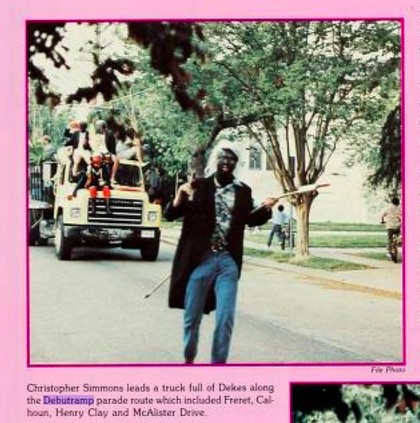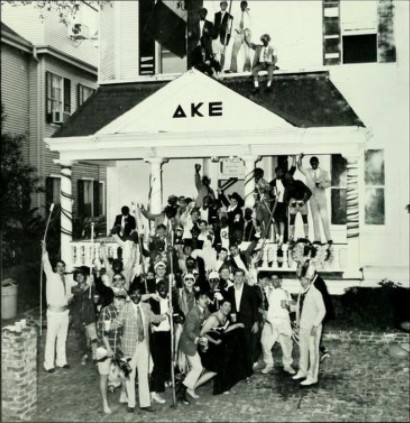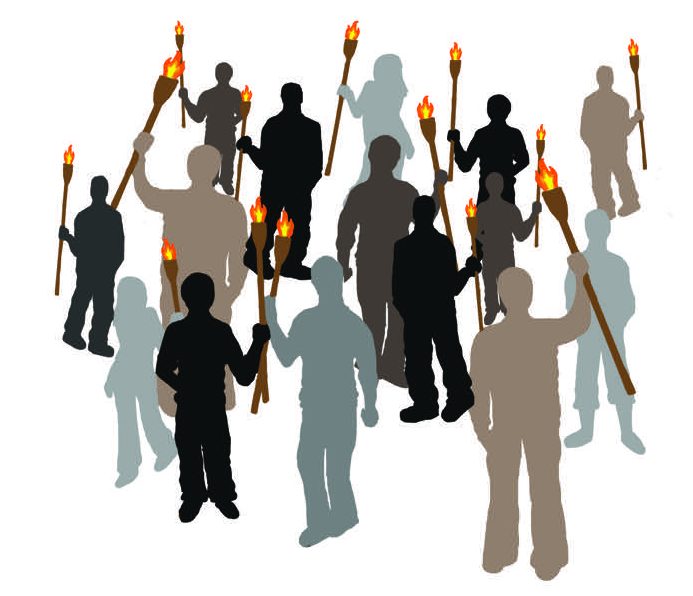Tulane reflects on racial past in light of Charlottesville events
More stories from Nile Pierre
More stories from Emily Fornof
More stories from Jessica Galloway
More stories from Kila Moore
This past month, a “Unite the Right” rally, led by white nationalists on the University of Virginia’s Charlottesville campus, incited violence and sent waves of polarization throughout the country. Thirty years prior to the rally that generated national attention, members of the Tulane chapter of the Delta Kappa Epsilon fraternity paraded down McAlister Drive on Tulane’s campus in blackface carrying lit flambeau.
Originally planned for Saturday, Aug. 12, “Unite the Right” was organized to protest the removal of a statue of Confederate General Robert E. Lee. The day before, however, white supremacists arrived at the University of Virginia bearing torches and chanting “blood and soil,” a nod to Nazi ideology.
“They’re white supremacists who gathered under the guise of protesting the removal of Confederate monuments, but ultimately their message was about inciting fear and spewing hatred,” senior Hannah Novak said.
For some college students across the nation, Charlottesville appeared to be an isolated incident. Others, though, recall politically charged events that have been occurring on college campuses for many years. With the DKE incident three decades ago, Tulane is no exception.
In 1987 the DKE fraternity took to the streets of Tulane making fun of the sociocultural traditions of New Orleans, specifically the city’s black residents.

As part of its 30th annual Debutramp ball, approximately 60 members of DKE held a parade in which some of the participants wore blackface, donned Afro-American Congress of Tulane t-shirts and carried flambeaux.
“… A member of the parade carrying a flambeau jabbed it back and forth in our direction implying that he would burn us,” Class of 1989 alumna Alandas Dobbins said in a statement following the incident. “… The parade and both incidents were disgraceful, degrading and a mocking to me and my heritage as a Afro-American and justice should be served.”
Carolyn Barber-Pierre, assistant vice president for student affairs, worked at Tulane in 1987 and recalls the harmful effects of the DKE incident.
“It was very hurtful for a lot of folks to see them dressed up in blackface with all kinds of stereotypical images of a certain racial group,” Barber-Pierre said. “… You can have good intentions, you can have fun intentions, you can make fun, but the impact sends different messages depending on which social group it’s targeted at.”
While the intent of the DKE members may leave room for discussion and interpretation, the purpose of the white supremacists that protested more recently on UVA’s campus remains clear for many students.
“They’re white supremacists who gathered under the guise of protesting the removal of Confederate monuments, but ultimately their message was about inciting fear and spewing hatred,” senior Hannah Novak said.
When the marchers gathered again on Saturday in Charlottesville, they clashed with counter-protesters, resulting in 35 injuries and three deaths. Neo-Nazi James Alex Fields Jr. drove his car into a crowd of demonstrators killing 32-year-old Heather Heyer. The other two deaths were those of state troopers killed in a helicopter incident while surveying the rally.
For Christian Hooks, Tulane Black Student Union treasurer, Heyer’s death served as a wake-up call for the bigotry that still exists in the country, a call that some saw as delayed.
“It’s just extremely upsetting to me that our efforts for equality as African-Americans go unnoticed and it takes the unfortunate death of a white woman to open the eyes of some politicians to the issues that we as African-Americans struggle with on a daily basis,” Hooks said.

While there are different circumstances in the two events, Barber-Pierre recognized a similarity in Tulane’s response to both Charlottesville and the event in 1987.
“Basically there was a statement from the president,” Barber-Pierre said. “A real reflection of what our values are as an institution. A lot of what our current president said was already expressed by our previous president about not tolerating hate and hateful acts.”
Some students said they think parades such as the one in 1987 and the event in Charlottesville could happen again in view of the social climate that exists presently.
“… The DKE Debutramp ball was not the only incident,” Tulane senior Amber Thorpe, who wrote a paper on the incident for a Tulane seminar titled “Race and Higher Education,” said. “There were several cross-burnings on the front lawns of fraternities that let in black students in the early 90’s. So it’s very clear that this is a trend on college that’s been in existence for a very long period of time and that will probably just get more blatant again.”
Campus entities such as the Tulane University Police Department said they want to improve emergency preparedness on campus in light of the violence that occurred in Charlottesville.
“Events such as Charlottesville also call for the thorough review of all our practices,” TUPD Chief Joseph Bishop said. “I believe when called upon TUPD will rise to the challenge.”
In response to concerns that more hate rallies could occur on campus, Tulane President Michael Fitts ensured students in his View from Gibson, sent out to students on Aug. 16 that, though there may still be racial problems lingering at Tulane, an event of such a large scale is unlikely to happen on Tulane’s campus.
“Through efforts such as the Presidential Commission on Race and Tulane Values, we are working hard to improve race relations on campus and ensure that all members of our academic community are welcomed, supported and valued,” Fitts wrote.
Fitts emphasized Tulane’s principles and affirmed the university’s fundamental idea of equality throughout the email.
“… We forever proclaim our Tulane values—that no member of our community ever be made to feel like they don’t belong here,” Fitts wrote in the View from Gibson. “This is OUR Tulane, and it would not be the same without each and every one of you in it.”
Your donation will support the student journalists of Tulane University. Your contribution will allow us to purchase equipment and cover our annual website hosting costs.



